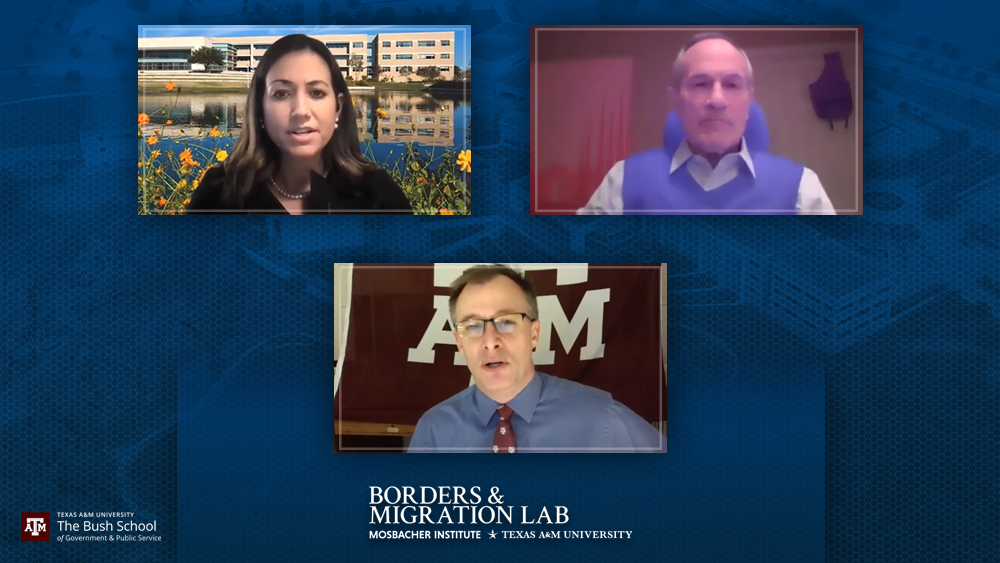
On February 22, 2021, the Mosbacher Institute’s Borders and Migration Program hosted Alan Bersin, a former commissioner of U.S. Customs and Border Protection and a former Assistant Secretary for the Department of Homeland Security. Bersin’s talk, entitled “Biden and the U.S.-Mexico Border,” was the inaugural event in a new speaker series called The Other Side of the Border: Ties that Bind and Issues that Divide, which features practitioners working on the border and in Mexico and Latin America.
For Bersin, the main border policy question is how to build a fair, equitable, and humanitarian system open to migration that recognizes the extraordinary role that migrants have played in the building of this country but does not overwhelm the system at the border and respects the rule of law. According to Bersin, the Trump administration showed that punitive and restrictive policies do not work to prevent immigrants from heading to the United States. He stated that in Central America, where the majority of migrants at the southern border now originate, push factors, such as violence, poverty, and lack of opportunity, continue to send people north. Smugglers and migrants capitalize on a broken U.S. asylum system in which the credible fear test does not function properly within an immigration court system that has over 1 million backlogged cases and wait times for court dates of two to three years. In fact, Bersin noted, the decrease in border arrivals observed after the peak in May 2019 was because the Trump administration threatened Mexico with trade consequences unless they controlled the movement of migrant flows.
Bersin explained that the initial decision to parole people into the country to wait for their immigration hearings was made by the Obama administration in response to the egregious conditions under which immigrants were being kept. Now, President Biden seems to be moving toward the same type of policy. However, the Biden administration is facing the same challenge the Obama administration did: allowing people to be paroled into the country under a humanitarian concern may create public opinion and political backlash, which Bersin claims helped Trump win the election under a strong anti-immigrant message. Facing the worst economic crisis in decades, a world pandemic, and an immigration system that is not prepared to receive the large numbers of migrants likely to come given the dire conditions in sending countries, we risk a humanitarian crisis that may adversely affect public perceptions moving forward, according to Bersin. What he stated we need is time to fix the system.
Bersin argued that we need comprehensive immigration reform, including fixing the asylum system but also addressing DACA and bringing 11 million undocumented people out of the shadows and incorporating them into American life. To do that, President Biden needs to stop sending mixed messages saying that he is fixing policies but asking migrants to wait. They will not wait. The “come but don’t come” message, Bersin said, will lead us to a situation where the laudable efforts to reverse cruel, inhumane, and restrictive policies will result in an overwhelmed border. In the resulting political contentiousness, we will not get the reform we need, and we will end up in the continuous impasse that we have had for years. The message has to be clear, “For the next six months, don’t come to the border unless you have an extraordinary humanitarian parole case, or you will be sent back home.” During those months, the Biden administration needs to work on procedures for either off-shore asylum processing or in-country asylum processing. He will still address the cases of greatest humanitarian need, but through application processes in sending countries and not at the borderline. Bersin concluded with the observation that if the Biden administration buys that time, it will have the opportunity to achieve what it is aiming for. But if Biden deals with an overwhelmed border that is then politicized, as it surely will be, he will not succeed.
You can view Biden and the U.S.-Mexico Border on the Bush School YouTube channel.
The next talk in the series will be on April 13, 2021, when Ms. Ginger Jacobs, a California Immigration Attorney, will bust myths around immigration and asylum.

